南方医科大学学报 ›› 2025, Vol. 45 ›› Issue (2): 304-312.doi: 10.12122/j.issn.1673-4254.2025.02.11
• • 上一篇
收稿日期:2024-08-06
出版日期:2025-02-20
发布日期:2025-03-03
通讯作者:
曹虹
E-mail:hpw2024@163.com;gzhcao@smu.edu.cn
作者简介:黄鹏伟,硕士,E-mail: hpw2024@163.com
基金资助:
Pengwei HUANG( ), Jie CHEN, Jinhu ZOU, Xuefeng GAO, Hong CAO(
), Jie CHEN, Jinhu ZOU, Xuefeng GAO, Hong CAO( )
)
Received:2024-08-06
Online:2025-02-20
Published:2025-03-03
Contact:
Hong CAO
E-mail:hpw2024@163.com;gzhcao@smu.edu.cn
Supported by:摘要:
目的 探究槲皮素(QC)在HIV-1 gp120诱导的星形胶质细胞神经毒性中的抑制作用及机制。 方法 分离原代星形胶质细胞作为细胞模型,将细胞分为对照组、QC组、HIV-1 gp120组和梯度剂量QC治疗组。免疫荧光法观察应激颗粒(SGs)形成。氧化应激标志物水平和相关蛋白表达水平分别使用特异性试剂盒和Western blotting测定。HIV-1 gp120转基因小鼠(Gp120 tgm)灌胃50 mg/kg QC治疗4周。随后进行行为学评价实验,取血清进行氧化应激指标检测,取脑组织进行免疫组化染色与Western blotting分析。 结果 体外实验中,QC减少星形胶质细胞中的SGs(P<0.05),提高抗氧化指标水平(P<0.05),同时降低氧化物质水平(P<0.001),并且上调与SGs解聚相关的蛋白水平(P<0.05)。在体内,QC改善了Gp120 tgm的认知功能障碍表现,缓解氧化应激(P<0.05),促进SGs解聚相关蛋白表达(P<0.05)。 结论 QC通过抑制氧化应激,促进SGs解聚蛋白表达和SGs解聚,减轻HIV-1 gp120诱导的星形胶质细胞毒性和改善认知功能。提示QC具备作为HIV-1相关神经认知障碍的治疗药物的潜力。
黄鹏伟, 陈洁, 邹金虎, 高雪锋, 曹虹. 槲皮素促进应激颗粒G3BP1解聚改善HIV-1 gp120诱导的星形胶质细胞神经毒性[J]. 南方医科大学学报, 2025, 45(2): 304-312.
Pengwei HUANG, Jie CHEN, Jinhu ZOU, Xuefeng GAO, Hong CAO. Quercetin mitigates HIV-1 gp120-induced rat astrocyte neurotoxicity via promoting G3BP1 disassembly in stress granules[J]. Journal of Southern Medical University, 2025, 45(2): 304-312.

图1 QC与HIV-1 gp120对星形胶质细胞活力的影响
Fig.1 Effects of concentration gradient of quercetin (QC) alone (A) and in combination with HIV-1 gp120. (B) on viability of primary rat astrocytes. ***P<0.001 vs 0 μmol/L. **P<0.01, ***P<0.001 vs HIV-1 gp120+0 μmol/L QC.
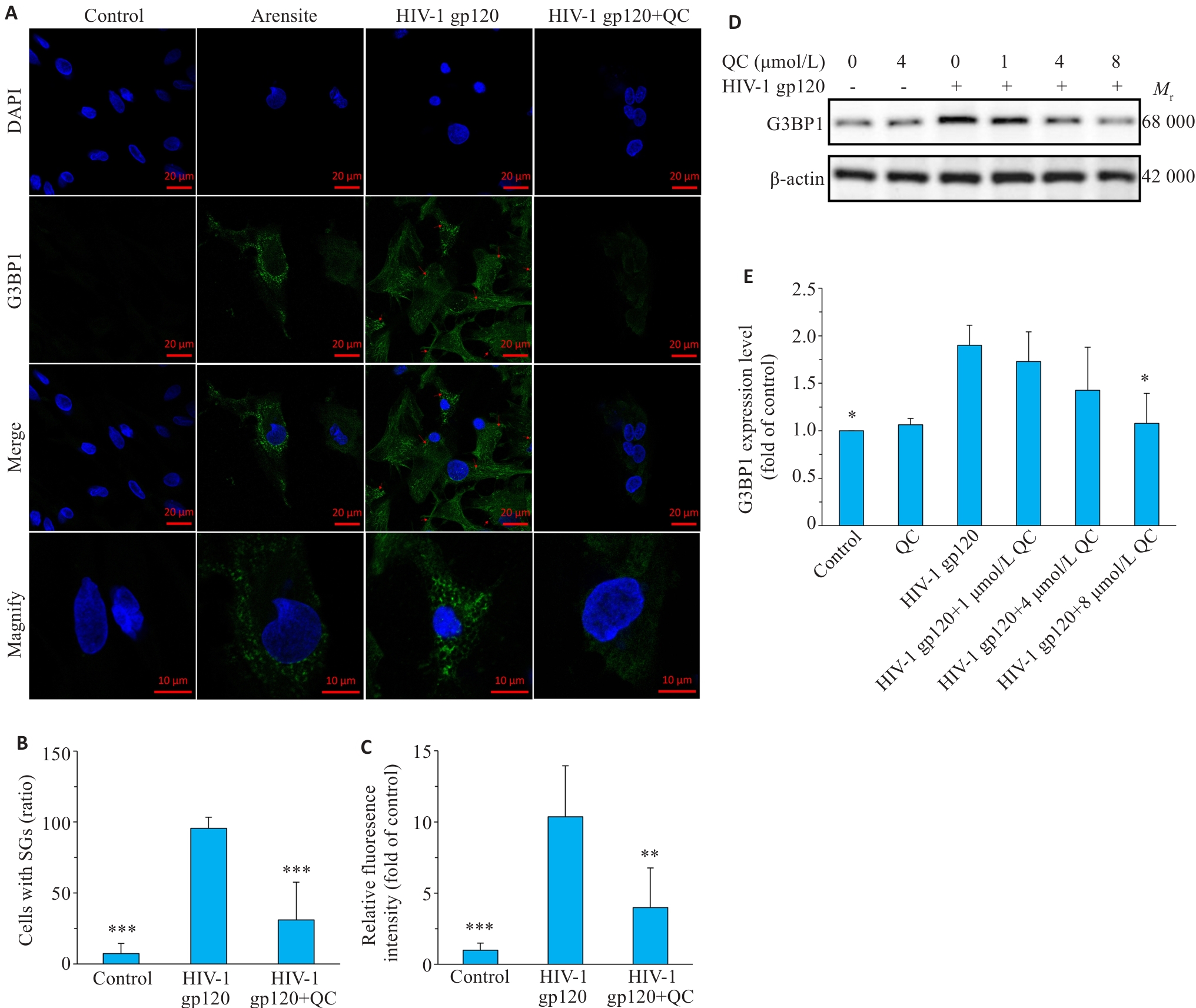
图2 QC降低星形胶质细胞中SGs阳性细胞比例
Fig.2 QC reduces the ratio of stress granule (SG)‑positive cells in HIV-1 gp120-induced primary rat astrocytes. A: Immunofluorescence staining of primary rat astrocytes. B: Ratio of SG-positive cells. C: Immunofluorescence intensity of G3BP1. D, E: Results of Western blotting for detecting G3BP1 protein expression level (fold of control). *P<0.05, **P<0.01, ***P<0.001 vs HIV-1 gp120 group.
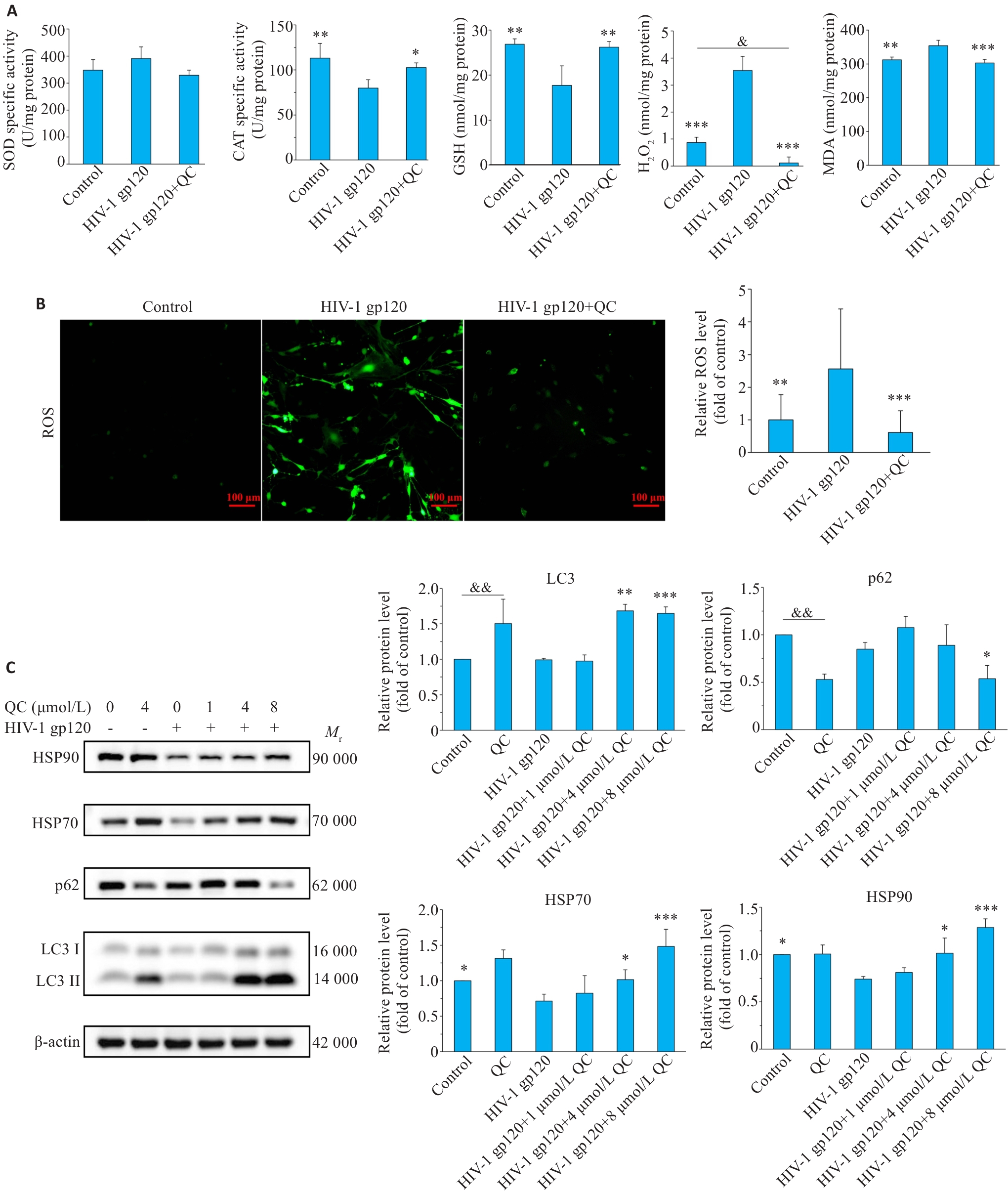
图3 QC减轻氧化应激并促进原代星形胶质细胞SGs解聚蛋白表达
Fig.3 QC reduces oxidative stress and promotes expression of SG-depolymerizing proteins in primary rat astrocytes in vitro. A: Specific activity of SOD and CAT and contents of GSH, H2O2 and MDA in primary rat astrocytes in each group. B: ROS level and fluorescence intensity. C: Western blotting for detecting expressions levels of SG-depolymerizing proteins in primary rat astrocytes. *P<0.05, **P<0.01, ***P<0.001 vs HIV-1 gp120 group. &P<0.05, &&P<0.01.
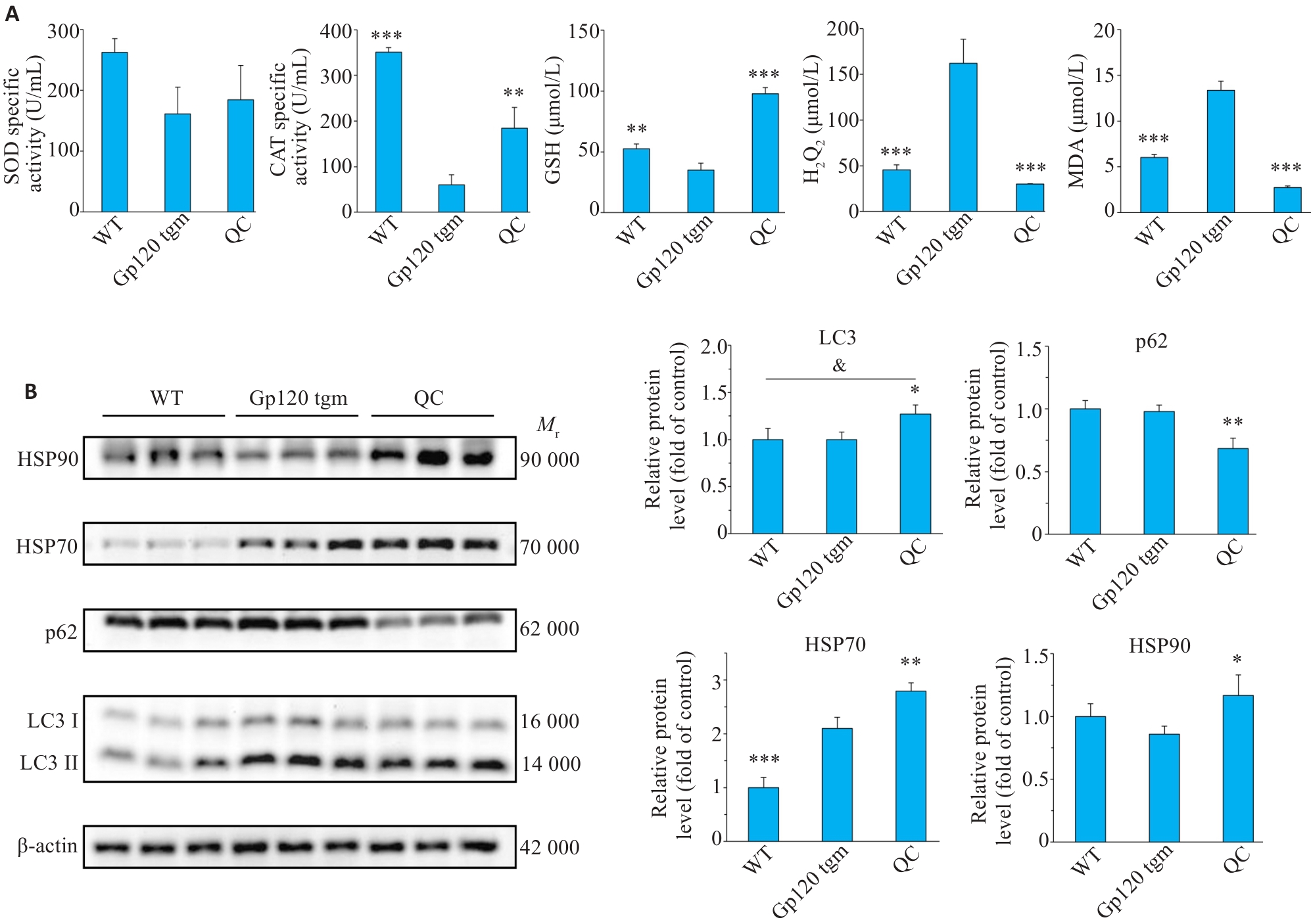
图4 QC对Gp120 tgm脑组织氧化应激和SGs解聚蛋白表达的影响
Fig.4 Effects of QC on oxidative stress indexes and expressions of SG-depolymerizing proteins in brain tissues of Gp120 tgm mice. A: Serum levels of SOD and CAT activities and GSH, H2O2 and MDA contents in each group. B: Results of Western blotting for detecting the expression levels of SG-depolymerizing proteins in the brain tissues of the mice in each group. *P<0.05, **P<0.01, ***P<0.001 vs Gp120 tgm group. &P<0.05.
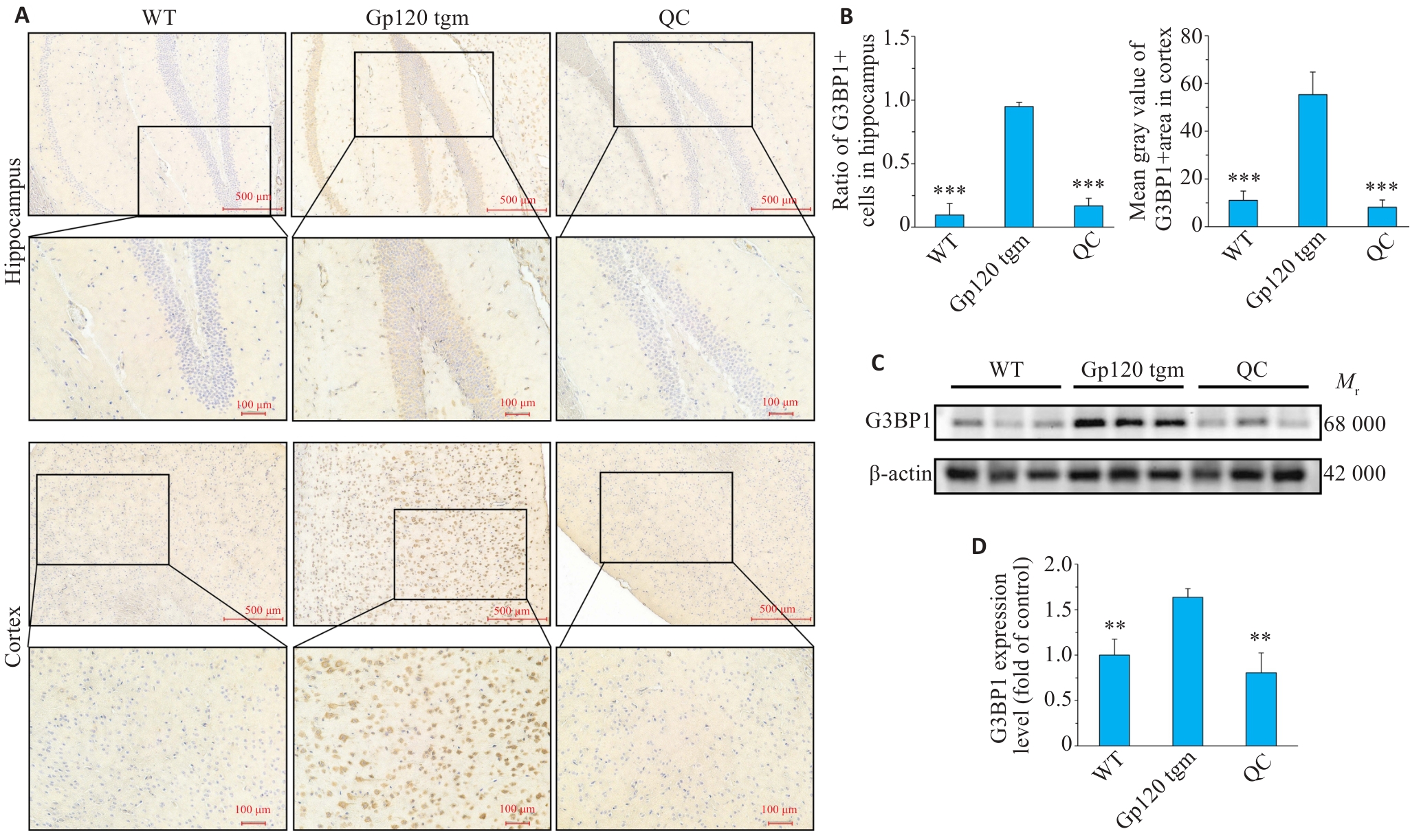
图5 QC降低Gp120 tgm脑组织SGs水平
Fig.5 QC decreases the level of SGs in the brain tissues of Gp120 tgm mice. A, B: Immunohistochemical staining for G3BP1 in the hippocampus and cortex. C, D: Results of Western blotting for detecting the expression level of G3BP1. **P<0.01, ***P<0.001 vs Gp120 tgm group.
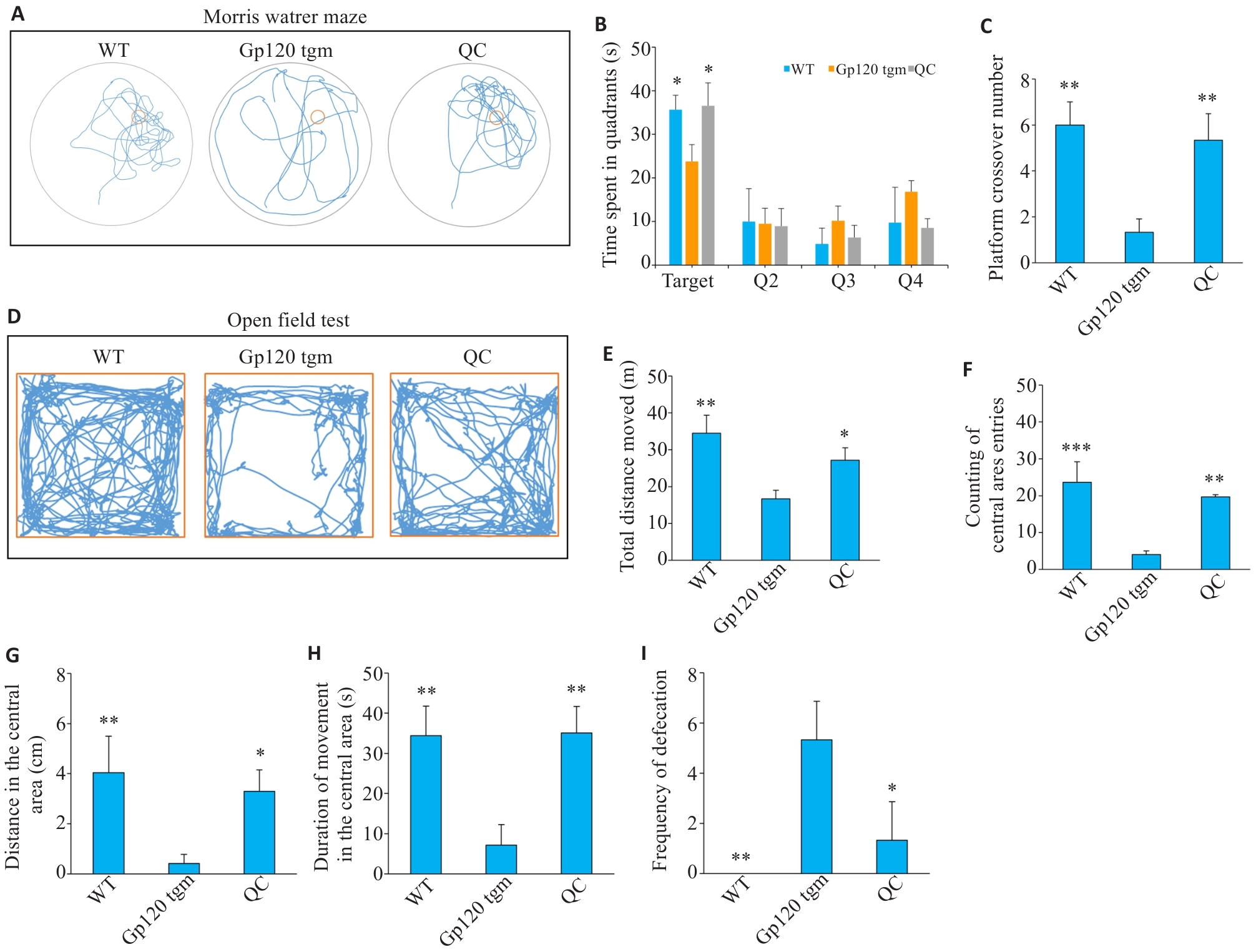
图6 QC改善Gp120 tgm的认知功能障碍表现
Fig.6 QC improves cognitive function of Gp120 tgm mice. A-E: Results of Morris water maze test (A-C) and open field test (D-I) in each group. *P<0.05, **P<0.01, ***P<0.001 vs Gp120 tgm group.
| 1 | Bailon L, Mothe B, Berman L, et al. Novel approaches towards a functional cure of HIV/AIDS[J]. Drugs, 2020, 80(9): 859-68. |
| 2 | Sreeram S, Ye FC, Garcia-Mesa Y, et al. The potential role of HIV-1 latency in promoting neuroinflammation and HIV-1-associated neurocognitive disorder[J]. Trends Immunol, 2022, 43(8): 630-9. |
| 3 | Thompson LJ, Genovese J, Hong ZZ, et al. HIV-associated neurocognitive disorder: a look into cellular and molecular pathology[J]. Int J Mol Sci, 2024, 25(9): 4697. |
| 4 | Niedzielska E, Smaga I, Gawlik M, et al. Oxidative stress in neuro-degenerative diseases[J]. Mol Neurobiol, 2016, 53(6): 4094-125. |
| 5 | Panas MD, Ivanov P, Anderson P. Mechanistic insights into mammalian stress granule dynamics[J]. J Cell Biol, 2016, 215(3): 313-23. |
| 6 | Tourrière H, Chebli K, Zekri L, et al. The RasGAP-associated endoribonuclease G3BP assembles stress granules[J]. J Cell Biol, 2003, 160(6): 823-31. |
| 7 | Wang C, Duan YJ, Duan G, et al. Stress induces dynamic, cytotoxicity-antagonizing TDP-43 nuclear bodies via paraspeckle LncRNA NEAT1-mediated liquid-liquid phase separation[J]. Mol Cell, 2020, 79(3): 443-58. e7. |
| 8 | MacKenzie IR, Nicholson AM, Sarkar M, et al. TIA1 mutations in amyotrophic lateral sclerosis and frontotemporal dementia promote phase separation and alter stress granule dynamics[J]. Neuron, 2017, 95(4): 808-16. e9. |
| 9 | Babaei F, Mirzababaei M, Nassiri-Asl M. Quercetin in food: possible mechanisms of its effect on memory[J]. J Food Sci, 2018, 83(9): 2280-7. |
| 10 | Deepika, Maurya PK. Health benefits of quercetin in age-related diseases[J]. Molecules, 2022, 27(8): 2498. |
| 11 | Costa LG, Garrick JM, Roquè PJ, et al. Mechanisms of neuroprotection by quercetin: counteracting oxidative stress and more[J]. Oxid Med Cell Longev, 2016, 2016: 2986796. |
| 12 | Fão L, Mota SI, Cristina Rego A. Shaping the Nrf2-ARE-related pathways in Alzheimer's and Parkinson's diseases[J]. Ageing Res Rev, 2019, 54: 100942. |
| 13 | Sabogal-Guáqueta AM, Muñoz-Manco JI, Ramírez-Pineda JR, et al. The flavonoid quercetin ameliorates Alzheimer's disease pathology and protects cognitive and emotional function in aged triple tran-sgenic Alzheimer's disease model mice[J]. Neuropharmacology, 2015, 93: 134-45. |
| 14 | Bahar E, Kim JY, Yoon H. Quercetin attenuates manganese-induced neuroinflammation by alleviating oxidative stress through regulation of apoptosis, iNOS/NF-κB and HO-1/Nrf2 pathways[J]. Int J Mol Sci, 2017, 18(9): 1989. |
| 15 | Cui ZF, Zhao XT, Amevor FK, et al. Therapeutic application of quercetin in aging-related diseases: SIRT1 as a potential mechanism[J]. Front Immunol, 2022, 13: 943321. |
| 16 | Xie RJ, Zhao WJ, Lowe S, et al. Quercetin alleviates kainic acid-induced seizure by inhibiting the Nrf2-mediated ferroptosis pathway[J]. Free Radic Biol Med, 2022, 191: 212-26. |
| 17 | Chen J, Zou JH, Huang PW, et al. KYNA ameliorates glutamate toxicity of HAND by enhancing glutamate uptake in A2 astrocytes[J]. Int J Mol Sci, 2024, 25(8): 4286. |
| 18 | Lun JX, Li YB, Gao XF, et al. Kynurenic acid blunts A1 astrocyte activation against neurodegeneration in HIV-associated neuroco-gnitive disorders[J]. J Neuroinflammation, 2023, 20(1): 87. |
| 19 | Toggas SM, Masliah E, Rockenstein EM, et al. Central nervous system damage produced by expression of the HIV-1 coat protein gp120 in transgenic mice[J]. Nature, 1994, 367(6459): 188-93. |
| 20 | González-Scarano F, Martín-García J. The neuropathogenesis of AIDS[J]. Nat Rev Immunol, 2005, 5(1): 69-81. |
| 21 | Kaul M, Garden GA, Lipton SA. Pathways to neuronal injury and apoptosis in HIV-associated dementia[J]. Nature, 2001, 410(6831): 988-94. |
| 22 | Toggas SM, Masliah E, Mucke L. Prevention of HIV-1 gp120-induced neuronal damage in the central nervous system of transgenic mice by the NMDA receptor antagonist memantine[J]. Brain Res, 1996, 706(2): 303-7. |
| 23 | Brandebura AN, Paumier A, Onur TS, et al. Astrocyte contribution to dysfunction, risk and progression in neurodegenerative disorders[J]. Nat Rev Neurosci, 2023, 24(1): 23-39. |
| 24 | Guo JL, Lee VMY. Cell-to-cell transmission of pathogenic proteins in neurodegenerative diseases[J]. Nat Med, 2014, 20(2): 130-8. |
| 25 | Ebrahimi-Fakhari D, Wahlster L, McLean PJ. Protein degradation pathways in Parkinson's disease: curse or blessing[J]. Acta Neuropathol, 2012, 124(2): 153-72. |
| 26 | Wolozin B, Ivanov P. Stress granules and neurodegeneration[J]. Nat Rev Neurosci, 2019, 20(11): 649-66. |
| 27 | Grimaldi G, Catara G, Palazzo L, et al. PARPs and PAR as novel pharmacological targets for the treatment of stress granule-associated disorders[J]. Biochem Pharmacol, 2019, 167: 64-75. |
| 28 | Protter DSW, Parker R. Principles and properties of stress granules[J]. Trends Cell Biol, 2016, 26(9): 668-79. |
| 29 | Ganassi M, Mateju D, Bigi I, et al. A surveillance function of the HSPB8-BAG3-HSP70 chaperone complex ensures stress granule integrity and dynamism[J]. Mol Cell, 2016, 63(5): 796-810. |
| 30 | Franzmann T, Alberti S. Ubiquitin protein helps cells to recover from stress[J]. Nature, 2021, 597(7875): 183-4. |
| 31 | Wippich F, Bodenmiller B, Trajkovska MG, et al. Dual specificity kinase DYRK3 couples stress granule condensation/dissolution to mTORC1 signaling[J]. Cell, 2013, 152(4): 791-805. |
| 32 | Chitiprolu M, Jagow C, Tremblay V, et al. A complex of C9ORF72 and p62 uses arginine methylation to eliminate stress granules by autophagy[J]. Nat Commun, 2018, 9(1): 2794. |
| 33 | Maxwell BA, Gwon Y, Mishra A, et al. Ubiquitination is essential for recovery of cellular activities after heat shock[J]. Science, 2021, 372(6549): eabc3593. |
| 34 | Sharma S, Raj K, Singh S. Neuroprotective effect of quercetin in combination with piperine against rotenone- and iron supplement-induced Parkinson's disease in experimental rats[J]. Neurotox Res, 2020, 37(1): 198-209. |
| [1] | 龙秀鹏, 陶顺, 阳绅, 李素云, 饶利兵, 李莉, 张哲. 槲皮素通过抑制MAPK信号通路改善心力衰竭[J]. 南方医科大学学报, 2025, 45(1): 187-196. |
| [2] | 刘青, 刘敬, 郑逸航, 雷金, 黄建华, 刘思妤, 刘芳, 彭群龙, 张远芳, 王俊杰, 李玉娟. 积雪草活性成分槲皮素通过介导STAT3磷酸化抑制IL-23/IL-17A炎症轴发挥抗银屑病作用[J]. 南方医科大学学报, 2025, 45(1): 90-99. |
| [3] | 姜一凡, 李小荣, 耿嘉逸, 陈永锋, 唐碧, 康品方. 槲皮素通过抑制HMGB1/RAGE/NF-κB信号通路减轻糖尿病引起的大鼠肾脏损伤[J]. 南方医科大学学报, 2024, 44(9): 1769-1775. |
| [4] | 张钰明, 夏士程, 张淋淋, 陈梦茜, 刘晓婧, 高琴, 叶红伟. 金银花提取物对小鼠阿霉素肝脏损伤的保护作用[J]. 南方医科大学学报, 2024, 44(8): 1571-1581. |
| [5] | 任志军, 刁建新, 王奕婷. 芎归汤通过抑制氧化应激诱导的心肌凋亡减轻小鼠心梗后心衰引起的心肌损伤[J]. 南方医科大学学报, 2024, 44(7): 1416-1424. |
| [6] | 陈洁, 刘晨旭, 王春, 李丽, 陶伟婷, 徐婧茹, 唐红辉, 黄丽. 外源性瘦素通过上调星形胶质细胞GLT-1和GLAST的表达减轻小鼠脑缺血再灌注引起的谷氨酸兴奋毒性损伤[J]. 南方医科大学学报, 2024, 44(6): 1079-1087. |
| [7] | 梁国新, 唐红悦, 郭畅, 张明明. miR-224-5p调控PI3K/Akt/FoxO1轴抑制氧化应激减轻缺氧/复氧诱导的心肌细胞损伤[J]. 南方医科大学学报, 2024, 44(6): 1173-1181. |
| [8] | 满 豪, 王建伟, 吴 毛, 邵 阳, 杨俊锋, 李绍烁, 吕锦业, 周 悦. 脊髓康通过激活星形胶质细胞的YAP/PKM2信号轴促进脊髓损伤大鼠神经功能的恢复[J]. 南方医科大学学报, 2024, 44(4): 636-643. |
| [9] | 陈国栋, 罗素新. 秋水仙碱通过激活AMPK减轻小鼠心肌缺血再灌注损伤[J]. 南方医科大学学报, 2024, 44(2): 226-235. |
| [10] | 凌旭光, 徐雯雯, 庞观来, 洪旭星, 刘凤芹, 李 洋. 茶多酚通过抑制NLRP3炎症小体改善脓毒症小鼠的急性肺损伤[J]. 南方医科大学学报, 2024, 44(2): 381-386. |
| [11] | 舒萍, 袁孟珂, 杨珂, 何伟志, 刘丽. 槲皮素通过抑制NLRP3/Caspase-1/GSDMD信号通路抑制小鼠成纤维细胞焦亡[J]. 南方医科大学学报, 2024, 44(10): 1874-1880. |
| [12] | 孙晓鹏, 史 航, 张 磊, 刘 中, 李克威, 钱玲玲, 朱星宇, 杨康佳, 付 强, 丁 华. 外胚层间充质干细胞来源的外泌体通过控制炎症和氧化损伤减少M1型小胶质细胞并促进H2O2处理后PC12细胞的存活[J]. 南方医科大学学报, 2024, 44(1): 119-128. |
| [13] | 叶红伟, 张钰明, 云 琦, 杜若丽, 李 璐, 李玉萍, 高 琴. 白藜芦醇可减轻高糖诱导的心肌细胞肥大:基于促进SIRT1表达维持线粒体稳态[J]. 南方医科大学学报, 2024, 44(1): 45-51. |
| [14] | 张宁宁, 邱 奇, 陈永锋, 孙正宇, 卢国庆, 王 磊, 康品方, 王洪巨. 槲皮素可改善大鼠肺动脉高压:基于调控 HMGB1/RAGE/NF-κB通路[J]. 南方医科大学学报, 2023, 43(9): 1606-1612. |
| [15] | 刘丽兰, 邓儒雅, 周稳进, 林 敏, 夏玲姿, 高海涛. 槲皮素降低邻苯二甲酸酯类混合物暴露致大鼠睾丸组织的氧化损伤的机制[J]. 南方医科大学学报, 2023, 43(4): 577-584. |
| 阅读次数 | ||||||
|
全文 |
|
|||||
|
摘要 |
|
|||||